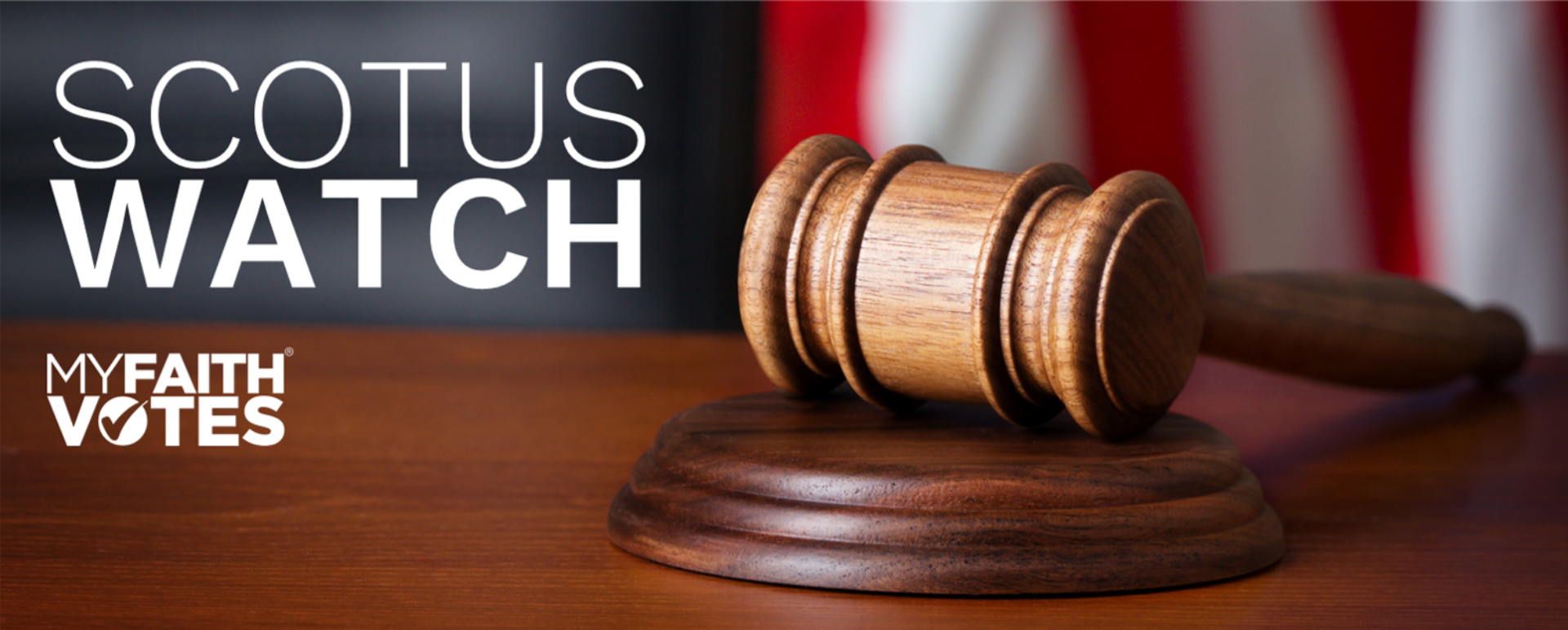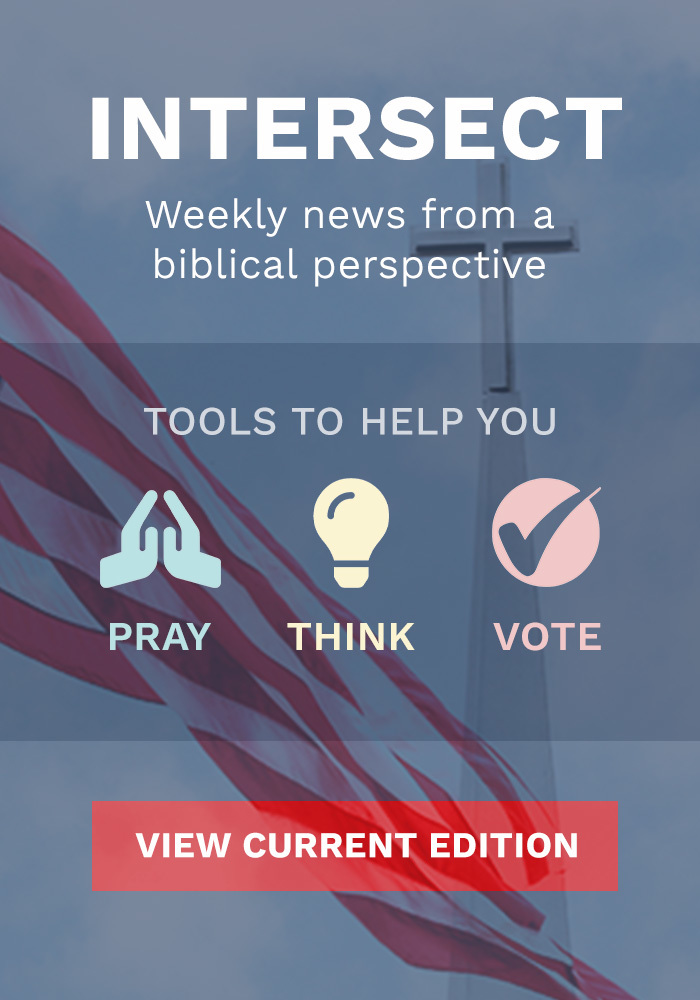
SCOTUS Watch | July 13, 2021
In May and June, the Court sat only to announce orders and opinions. The Court recessed at the beginning of July, but during the summer recess, they will continue to analyze new petitions for review, consider motions and applications, and make preparations for cases scheduled for fall argument.
The court issued 67 opinions during its 2020-2021 term. Another interesting note is that 43 percent (29 cases) had a 9-0 ruling.
In this issue we review the following opinions:
- Brnovich v. Democratic National Committee (Voting Rights)
- Americans for Prosperity Foundation v. Bonta (First Amendment)
- Fulton v. City of Philadelphia, Pennsylvania (Religious Liberty)
- California v. Texas (Affordable Care Act)
Brnovich v. Democratic National Committee (Voting Rights)
The central questions: 1. Does Arizona's out-of-precinct policy violate Section 2 of the Voting Rights Act? 2. Does Arizona's ballot-collection law violate Section 2 of the Voting Rights Act or the Fifteenth Amendment?
The outcome: In a 6-3 vote, the U.S. Supreme Court reversed the U.S. Court of Appeals for the 9th Circuit's ruling. Justice Alito wrote the majority opinion and Justice Gorsuch filed a concurring opinion, joined by Justice Thomas. Justice Kagan filed the dissenting opinion, joined by Justices Breyer and Sotomayor.
In 2016, several arms of the Democratic Party (DNC) sued Arizona for its out-of-precinct policy and its ballot-collection law. One was a prohibition on out-of-precinct voting, which has been on the books for more than 50 years. If a voter casts a vote in the wrong precinct, that ballot would not be counted, even if the voter was eligible for a statewide election.
The other was a statute enacted in 2016, which limited third parties — postal workers, election officials, caregivers, family members, or household members — who could collect completed absentee ballots from voters. Arizona had long limited who could distribute blank ballots, but it added a provision about who could collect completed ballots. A lower court determined that both laws disproportionately burdened minority voters and that the third-party collection ban was enacted with discriminatory intent.
Dissenters pointed out that some minority voters have a hard time getting to the polls. In response, Justice Alito for the majority wrote: “A procedure that appears to work for 98% or more of voters to whom it applies—minority and non-minority alike—is unlikely to render a system unequally open...”. He went on: “The dissent is correct that the Voting Rights Act exemplifies our country’s commitment to democracy, but there is nothing democratic about the dissent’s attempt to bring about a wholesale transfer of the authority to set voting rules from the States to the federal courts.”
The Supreme Court’s decision will have an immediate impact. Because the Biden administration’s Justice Department filed its lawsuit against Georgia’s recent election law before the court decided the case, it will likely withdraw or amend its complaint because it alleged that Georgia’s “out of precinct” provision, which is similar to Arizona’s, was racially discriminatory. That claim now seems unlikely to succeed.
You can read the ruling here.
Americans for Prosperity Foundation v. Bonta (First Amendment)
The outcome: In a 6-3 decision, the U.S. Supreme Court reversed the U.S. Court of Appeals for the 9th Circuit's ruling. Chief Justice Roberts delivered the majority opinion of the court. Justice Sotomayor filed a dissenting opinion, joined by Justices Breyer and Kagan.
This ruling upholds a 60-year-old precedent in NAACP v. Alabama, in which the Supreme Court rebuked Alabama for demanding that the NAACP hand over its membership lists—exposing its members to harassment and violence.
Two conservative advocacy groups, the Thomas More Law Center and Americans for Prosperity, followed the rules and filed Form 990s that contain general information about charitable contributions. That sufficed for years. When California attorney general Kamala Harris then came to that office, she asked for Schedule B’s that contain detailed information with names, addresses, and total contributions. And she threatened the charities with suspension and fines if they didn’t comply. She said her office needed that information to ferret out fraud, even as massive data leaks compromised her promise to keep the information confidential.
The ruling was a victory for the two nonprofit challengers, which had argued that the rule violates the First Amendment by deterring their donors from making contributions. As stated by ADF who represented Thomas More Law Center, "supporters, employees, and clients had faced intimidation, death threats, hate mail, boycotts, and even an assassination plot from ideological opponents. If California were to leak the private information of nonprofit donors—either accidentally or on purpose—the donors would be in very real danger. On top of that, the Supreme Court has held that the freedom of association is protected by the Constitution. That means Americans have the freedom to choose which groups or causes they associate with (or donate to) and whether or not to make that association public knowledge."
In her dissent, Justice Sotomayor suggested that the ruling could have an effect beyond the nonprofit and charitable spheres, including on campaign contributions, writing that the ruling “marks reporting and disclosure requirements with a bull’s-eye.”
You can read the ruling here.
Fulton v. City of Philadelphia, Pennsylvania (Religious Liberty)
The outcome: In one of the most-watched cases of the term, the Supreme Court unanimously ruled, 9-0, that the city of Philadelphia violated the free-exercise rights of Catholic Social Services (CSS), a Catholic foster-care agency, by conditioning CSS’s continued provision of foster-care services on its agreeing to certify same-sex couples as foster parents.
Chief Justice Roberts wrote the opinion. Justice Coney Barrett filed a concurring opinion. Justices Alito and Gorsuch filed opinions concurring in the judgment only, of which Justice Thomas joined.
The Catholic Church had served Philadelphia’s vulnerable children for over two centuries, and for over 50 years, CSS was able to contract with the city to provide foster-care services while adhering to its religious beliefs. No same-sex couple had been denied the opportunity to be foster parents, but the city’s Department of Human Services informed CSS that it would no longer refer children to the agency after the Philadelphia Inquirer reported on the Archdiocese of Philadelphia’s long-standing position. The city later tried to justify its decision by the terms of its contract with CSS, which included a nondiscrimination clause and was subject to certain exceptions granted by the department’s commissioner, as well as by a nondiscrimination ordinance.
Chief Justice Roberts’ majority opinion concluded that the case was not an appropriate vehicle to revisit the Court’s narrow interpretation of the free-exercise clause in Employment Division v. Smith (1990), which held that an individual’s religious beliefs did not excuse compliance with an otherwise valid, neutral law of general applicability even where it burdened such beliefs.
While some saw this as a major victory for religious liberty, others are concerned the justices found an exquisitely narrow (and easily defeasible) ground to rule in favor of Catholic Social Services while ducking the larger issue of whether the First Amendment’s free exercise clause requires accommodation of religion. In fact, Justice Alito wrote in his concurring opinion that the Court’s “decision might as well be written on the dissolving paper sold in magic shops.”
You can read the ruling here.
California v. Texas (Affordable Care Act)
The outcome: In a 7-2 decision, the U.S. Supreme Court reversed the U.S. Court of Appeals for the 5th Circuit's ruling. Justice Breyer wrote the majority opinion. Justice Thomas filed a concurring opinion. Justice Alito filed a dissenting opinion, in which Justice Gorsuch joined.
The Court rejected a challenge to the ACA from Texas Attorney General Ken Paxton and 17 other Republican attorneys general on the grounds that the Republican AGs did not have the standing to challenge the Constitutionality of the law’s individual mandate, its prohibition on lifetime benefit caps, and its guarantee of protection for individuals with pre-existing conditions.
For the third time since its passage, the U.S. Supreme Court upheld the Affordable Care Act (ACA). The Court held that both the individual plaintiffs and the State plaintiffs lacked standing to challenge the individual mandate. As a result, the Court did not need to reach the merits of the constitutional challenge to the individual mandate or determine whether the individual mandate was “severable” from the rest of the ACA. The Court did not make a determination on whether the Affordable Care Act — also known as “Obamacare” — was itself constitutional.
In his dissent, Justice Samuel Alito, joined by Justice Neil Gorsuch, charged that the Court had ducked the constitutional issue to save the ACA. Justice Alito wrote that States’ costs of compliance with the ACA were injuries sufficient to establish standing, even if they were not directly traceable to the individual mandate. Further, Justice Alito concluded that the Court should have reached the merits of the case, held the individual mandate to be unconstitutional because it no longer falls under the taxing power as it does not collect any revenue, and that many of the most significant provisions of the ACA were inseverable and much of the law should fall.
The ruling may make it more difficult to challenge the Affordable Care Act in the future. The Court’s decision essentially blocks AGs and some individual plaintiffs from raising concerns about the law.
You can read the ruling here.
Pray for the Supreme Court Justices
We encourage you to pray faithfully for the Supreme Court Justices, by name, as they prepare for a busy fall term. The justices will be hearing the important abortion case that could reverse Roe v. Wade, along with many others.
Psalm 89:14 says, “Righteousness and justice are the foundation of your throne; steadfast love and faithfulness go before you.”
Pray for the Justices to seek God for His wisdom and justice. Pray for all parties involved in these cases and pray for the right thing to be done to preserve rule of law in our nation and to uphold our Constitution.
The Supreme Court Justices are: Chief Justice John Roberts, Amy Coney Barrett, Brett Kavanaugh, Clarence Thomas, Elena Kagan, Neil Gorsuch, Samuel Alito, Sonia Sotomayor, and Stephen Breyer.
sources: SCOTUSBlog, Ballotpedia
###
My Faith Votes— is a ministry that motivates, equips, and activates Christians in America to vote in every election, transforming our communities and influencing our nation with biblical truth. An estimated 25 million Christians who are registered to vote, fail to vote in presidential elections. My Faith Votes is on a mission to change this statistic by helping Christians act on their faith and vote in every election. When we pray unceasingly for our nation, think biblically about the issues, and vote consistently in every election the impact of Christians taking action from the local to the state and federal level will be unprecedented.
Website | www.myfaithvotes.org Twitter | @MyFaithVotes Facebook | My Faith Votes

 TV
TV